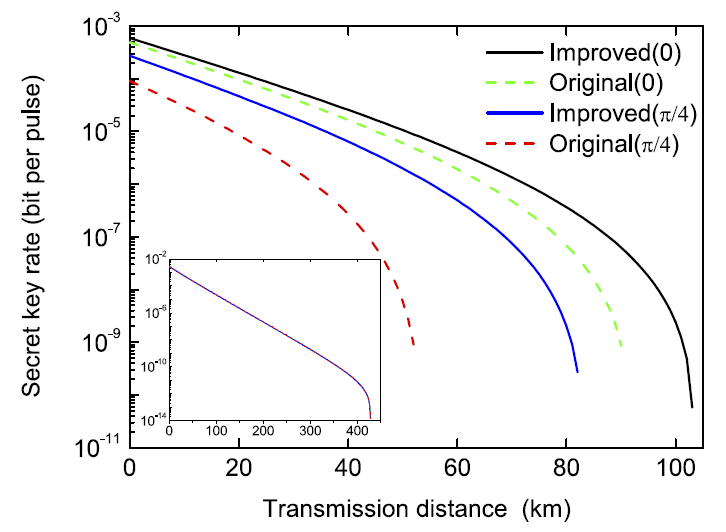Dr. Zhu Jianrong, a lecturer from JSOU’s School of Information and Electrical Engineering, and his collaborators designed a new reference-frame-independent quantum key distribution (RFI-QKD) protocol and a new reference-frame-independent measurement-device-independent quantum key distribution (RFI-MDI-QKD) protocol, which significantly improved the security key rate of RFI-QKD and RFI-MDI-QKD protocols considering the finite code length effect. The results were published in Improved Reference-Frame-Independent Quantum Key Distribution on Optics Letters in August 2022 as Editor's Pick.
Based on the basic principles of quantum mechanics, how to distribute quantum keys securely is a hotspot and difficult point in the field of information security. Reference-frame-independent quantum key distribution (RFI-QKD) can generate secure keys between two remote peers with an unknown and slowly drifted reference frame. It adopts a statistical quantity C independent of the rotation of the reference frame to estimate the eavesdropper’s knowledge. However, in practical scenarios, the estimation of C should be completed with data collected in a short period of time, since the variation of the reference frame during the run will smear its correlations. In the paper, Dr. Zhu and his team proposed to improve the performance of RFI-QKD with a new statistical quantity R, which is less sensitive to statistical fluctuations and more robust to the variation of the reference frame, and obtain an analytical bound to estimate the eavesdropper’s knowledge. Simulation results show that the performance of RFI-QKD in the non-asymptotic case can be significantly promoted, which is very promising in practical QKD systems. Furthermore, they apply the new statistical quantity R to the RFI measurement-device-independent QKD (RFI-MDI-QKD) protocol and demonstrate that significant improvement can also be obtained in RFI-MDI-QKD. This work is of great significance to realize high-performance and practical quantum secure communication.
In recent years, the School of Information and Electrical Engineering has attached great importance to high-level research as the core of its overall development. It has set interdisciplinary studies as the essential part of the School’s research work, actively recruited doctorate teachers, and made a series of achievements.

